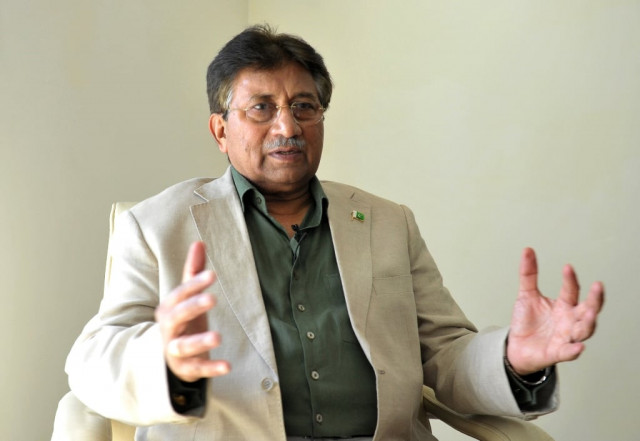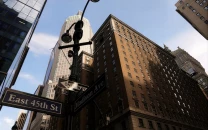‘Unconstitutional’ argument: Musharraf’s attorney invites ire of top court
Satti says his client didn’t expect justice from former CJ.

It seems that if he [Musharraf] will get a chance, then he will again subvert the Constitution, says Justice Asif Khosa. PHOTO: REUTERS
The Supreme Court took strong exception to the remarks of the defence team of General (retd) Pervez Musharraf regarding the 1973 Constitution on Monday, during the hearing of the former military ruler’s review petition against the top court’s July 31, 2009 judgment.
The 14-member bench – headed by Chief Justice Tassaduq Hussain Jilani – was hearing Musharraf’s review petition of the landmark judgment that declared the November 3, 2007 emergency and Provisional Constitutional Order (PCO) unconstitutional.
During the course of proceedings, the bench was astonished to hear the argument of Musharraf’s attorney Ibrahim Satti, who maintained that the 1973 Constitution does not reflect the ‘will of the people’ as it is an act of parliament, and not approved by the Constituent Assembly.

The bench asked his counsel why Musharraf moved the review petition against the court’s July 31, 2009 judgment under Article 188 of the same Constitution when he is not accepting the statute.
Referring to two paras of the review petition, Justice Asif Khosa said, “It seems that if he [Musharraf] gets a chance, then he will again subvert the Constitution. He should keep in mind that he had taken his presidential oath under the same Constitution and it was the same Constitution which had been suspended by him,” he added.
“I have taken oath to protect this Constitution; therefore I will not allow anyone to say that there is no Constitution,” another judge, Justice Khilji Arif Hussain said.
A visibly charge Satti accepted that he would not raise arguments in this regard at the time but that if the special court awards capital punishment to his client in the high treason case, he will relay the same contentions on his behalf.
Later on, however, Satti stated that he will expunge the arguments against the Constitution from the review petition. The court allowed him to delete two paragraphs. “You should be careful in the future in this regard,” the chief justice warned the lawyer.

In the review petition, Satti had stated that the Supreme Court was aware that the present Constitution is not a Constitution in the real sense as it was not enforced or given by the Constituent Assembly elected under the Yahya Khan regime. He argued that it was not passed by a fraction of West Pakistan members of the then National Assembly and can therefore never be termed as the constitution because the same lacks the ingredients of a constitution. Therefore, the petition maintained, its violation does not entail high treason.
During the hearing, the CJ also asked Satti whether he would be satisfied if the SC asks the special court to proceed on its own merit in the high treason case without considering the apex court’s judgments related to his client.
Justice Saqib Nisar also said it is best for Musharraf that the apex court ask the special court to decide the high treason case without influence from both the Sindh High Court Bar Association case (SHCBA) as well as the Tikka Iqbal case.
However, the counsel for the petitioner stated, “How can any court of the world spare Musharraf after delivering of July 31, 2009 judgment?” He requested that the bench declare the whole decision as void.
Justice Chaudhry Ijaz Ahmad agreed with Satti’s contentions that the July 31, 2009 judgment was against Musharraf.
Regarding the court’s queries about the delay in Musharraf’s review petition, Satti said they had challenged the judgment after four years and five months because they were not expecting justice during former chief justice Iftikhar Muhammad Chaudhry’s tenure.
He also referred to the case of incumbent Prime Minister Nawaz Sharif, who had filed an appeal against his disqualification after many years as he had also stated that he was not expecting justice during former de facto chief justice Abdul Hameed Dogar’s tenure.
Today (Tuesday), Musharraf’s defence will make arguments on the bias of judges in this case.
Published in The Express Tribune, January 29th, 2014.



















COMMENTS
Comments are moderated and generally will be posted if they are on-topic and not abusive.
For more information, please see our Comments FAQ